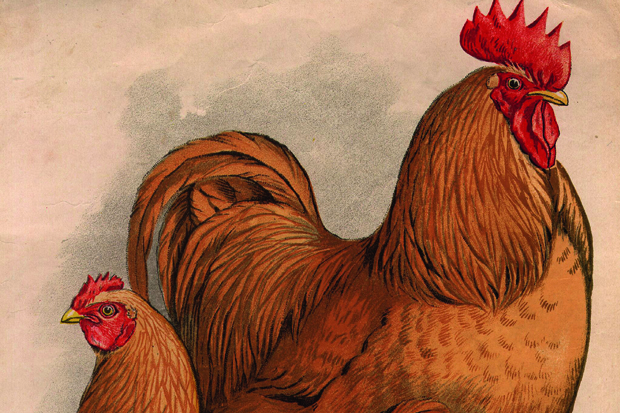I was saying the other week that my new hearing aids had come with a warning not to swallow their batteries, because this could be bad for you. I doubt if anyone would choose to swallow a battery, but such warnings against barely conceivable eventualities are now commonplace. Manufacturers rack their brains to think of new perils to which buyers of their products could theoretically be exposed. Sometimes these warnings make no sense. I will not distress you with details of the colonoscopy I endured last week (all fine, just one little benign polyp), but the packets of laxative powder designed to empty the bowels prior to this humiliating procedure were labelled ‘Keep out of reach and sight of children’. Out of reach, yes. But out of sight? What’s scary about the sight of a packet of powder?
Last weekend I went to the old-fashioned butcher in Towcester to buy a chicken for Sunday lunch, and affixed to its wrapping was a note saying ‘Cook before eating’. Who needs telling this? Even in Northamptonshire there can’t be many people so hungry, desperate or ignorant that they will hurl themselves upon a raw bird and gnaw away at it. But maybe chicken farmers feel they can’t be too careful and might be exposed to legal action if they haven’t given warning that raw chickens are not very good to eat. You’d think that even people who had never personally encountered a chicken would be aware of this from their viewing of cookery programmes on television. They may not ever cook anything themselves, but they will surely have grasped that with chickens cooking is the preferred approach.
Talking of chickens, I don’t want to count them before they’re hatched, as it were, but the position regarding my own poultry is a great deal better than it has been. Or so it seems. Having fretted for years about how to let my chickens wander the garden freely without being killed by foxes (very many having suffered this fate), I now have them fenced in behind yew hedges in a patch of garden that so far no fox has tried to enter. Maybe some brave Charlie (as people call foxes here) will have a go soon, but in the meantime all is peaceful and serene. I only have five chickens at the moment, but they’re laying five excellent eggs a day, and I don’t even have to shut them in their coops at night any more. It’s amazing how attached one can become to chickens, given that they are not exactly either intelligent or affectionate. I can’t imagine ever killing one and eating it, cooked or uncooked, and I expect most other chicken owners feel the same.
My ducks, too, are having a good time. Thanks to foxes, they have been reduced in number over the years from 14 to six, but for many months now the remaining ones have been spared. They live on the pond at the bottom of my garden, and foxes don’t like swimming; but ducks are nevertheless at risk when out of the water. So maybe the combined efforts of the Grafton Hunt and of the farmer, Geoffrey Smart, who assiduously stalks foxes with his rifle, have been having an effect. And now my team of ducks is about to grow with the addition of eight new ducklings.
Last time ducklings were born here they were only tiny when they followed their mother on to the pond, where they bobbed about like plastic ducklings in a child’s bathtub, only to be picked off one by one by herons. But this time one of my six ducks conveniently made her nest in a flower border against a wall of my house, where her progeny have been fenced in for safety until they have grown big enough to face the world outside. Their mother is an Indian Runner duck, but Mr Smart, who put up the fences, is convinced that her young are partly mallard. ‘I think she must have been raped,’ he said, though in my view the coupling could well have been consensual.
In any event, I am happy that a mallard has infiltrated my collection of Indian Runners and Khaki Campbells because I might hear some quacking at last. I have been irritated for some time that none of my ducks ever makes a noise even faintly resembling a quack, but I learn from John McEwen, former art critic of this magazine who writes a column about birds in the Oldie, that the mallard is the only one of the many species of duck that actually quacks. I wonder why I never knew that before?
Got something to add? Join the discussion and comment below.
Get 10 issues for just $10
Subscribe to The Spectator Australia today for the next 10 magazine issues, plus full online access, for just $10.
You might disagree with half of it, but you’ll enjoy reading all of it. Try your first month for free, then just $2 a week for the remainder of your first year.













Comments
Don't miss out
Join the conversation with other Spectator Australia readers. Subscribe to leave a comment.
SUBSCRIBEAlready a subscriber? Log in